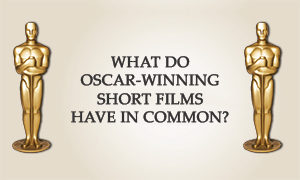 A week ago, British filmmakers Chris Overton and Rachel Shenton achieved the dream of so many short filmmakers – their names were read out at the Oscars and they scooped the Academy Award for Best Live Action Short Film for The Silent Child.
A week ago, British filmmakers Chris Overton and Rachel Shenton achieved the dream of so many short filmmakers – their names were read out at the Oscars and they scooped the Academy Award for Best Live Action Short Film for The Silent Child.
So I thought it was a good moment to take a look back and what types of short films have been nominated and victorious at the Academy Awards.
A short history of short films at the Oscars
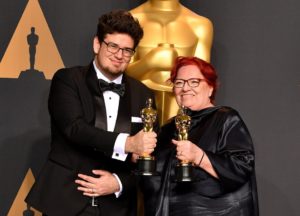 The Oscars are the annual awards given out by the Academy of Motion Picture Arts and Sciences. The Academy Awards began in 1929 and by 1934 they were already being called ‘the Oscars’. The moniker’s origin is disputed, coming either from Walt Disney, from Bette Davis’ husband or from the Academy’s Executive Secretary commenting that the statuette looked like her Uncle Oscar. In 2013, their official name was changed to “The Oscars”.
The Oscars are the annual awards given out by the Academy of Motion Picture Arts and Sciences. The Academy Awards began in 1929 and by 1934 they were already being called ‘the Oscars’. The moniker’s origin is disputed, coming either from Walt Disney, from Bette Davis’ husband or from the Academy’s Executive Secretary commenting that the statuette looked like her Uncle Oscar. In 2013, their official name was changed to “The Oscars”.
Oscar awards for short films have changed over the years:
- Between 1931 and 1935 there were three awards: Short Subject (Cartoon), Short Subject (Comedy) and Short Subject (Novelty). The very first year of the comedy short Oscar featured a minor scandal. Stout Hearts and Willing Hands was nominated but then disqualified before voting was complete, replaced by Scratch-As-Catch-Can. Sadly, the reason for the disqualification has been lost with even the Academy perplexed (or as they put it “No documentation has been found as to why this film was disqualified”).
- In 1936, the line-up was changed to include four short film Oscars: Short Subject (Cartoon), Short Subject (Color), Short Subject (One-reel) and Short Subject (Two-reel).
- The “Color” short award was dropped in 1938, leaving the other three.
- In 1941 a non-fiction short award was added, officially called “Documentary (Short Subject)“, although the following year, no films were nominated for the award. From 1942 onwards, the short documentary award joined the regular list of short film Oscar categories.
- In 1957, the one- and two-reel categories were merged, to form a single “Live-Action” award, which is the one we have today.
- In 1970, the “Short Subject (Cartoon)” award was renamed to “Short Subject (Animated)“
- Finally, from 1974, the animated and live-action categories stopped referring to the nominees as “Short Subjects” and started using the term “Short Film“. However, the documentary award is still officially called “Documentary (Short Subject)”.
For today’s research, I’ve focused on the live-action fiction short film award (i.e. Short Film (Live Action)) starting when the award was formed in 1957 and going up to and including the most recent awards (technically called the 2017 awards, even though they took place in February 2018).
What types of short films receive Oscar nominations?
In the past, I’ve shown how Drama films dominate most major film festivals and awards (Cannes, Berlin, London and BAFTAs). The short film Oscar seems to be slightly more diverse, in that it’s dominated by two genres rather than just one, namely Comedy and Drama.
Just under half of all nominated short films are Dramas and 40% are Comedies. Although Comedy comes second in nominations, it’s the clear victor in terms of Oscars won, with 45% of winners being a Comedy.
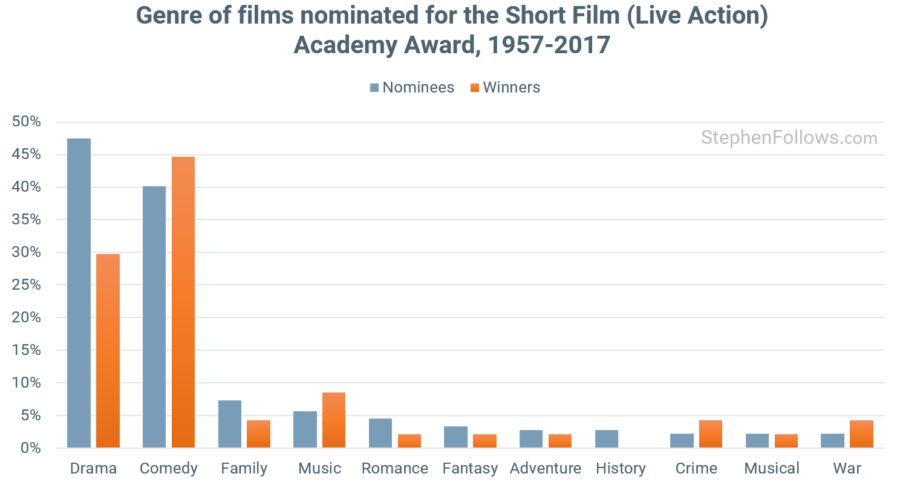
Note: Films were permitted to have up to three genres, hence why the totals may add up to more than 100%.
How long are Oscar-nominated short films?
Fewer than 6% of Oscar-nominated short films have a running time of under 10 minutes, with two-thirds opting for a length of between 11 and 26 minutes.
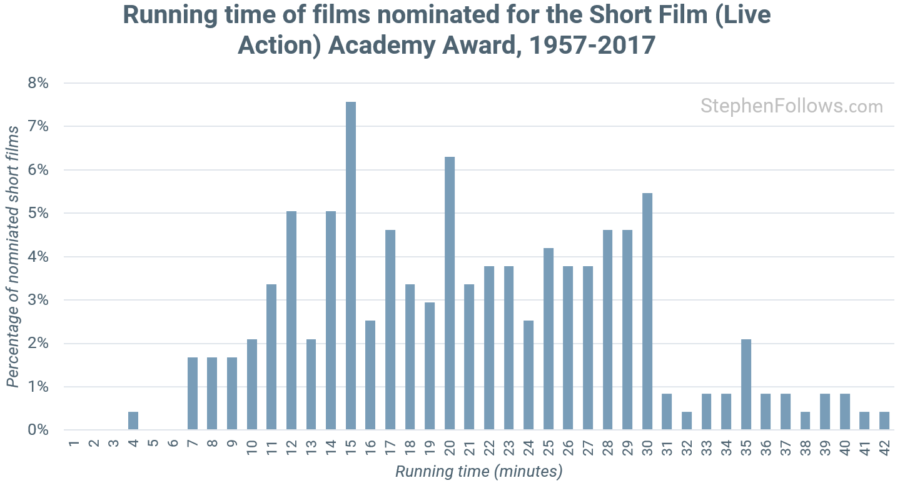
Over the past seven decades, the decade-wide average running time of Oscar-nominated shorts hasn’t changed a great deal, fluctuating between 18 and 23 minutes long.
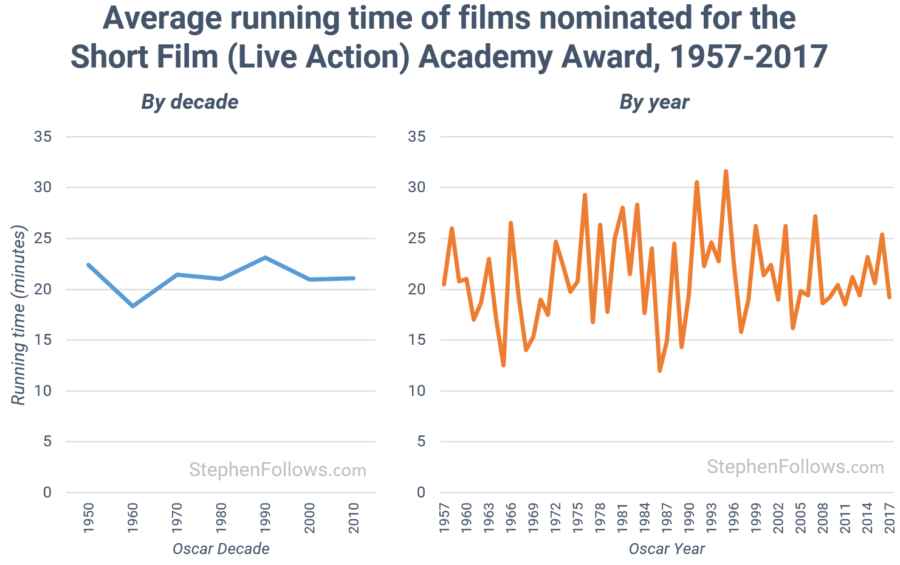
Oscar-winning short films skew a little longer (by around two minutes) than nominees, and are more often than not among the longest film nominated each year in the category.
What language are the films in?
This year’s short film Oscar winner is partially in Sign Language – an Oscar short film first. Among all short films, English prevails, accounting for 71% of nominees and 77% of winners since 1957.
In more recent years, English language dominance has waned and so far this decade has accounted for 53% of nominated short films.
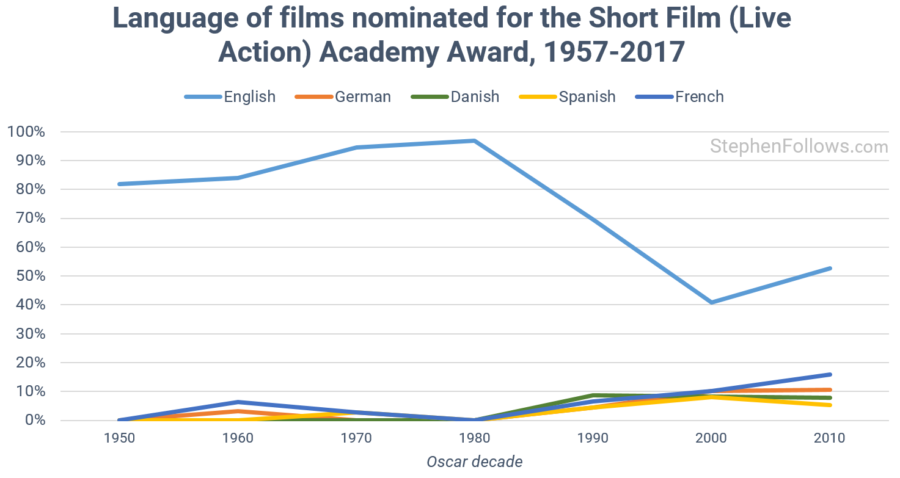
The patterns amongst country of origin are very much correlated to this. Films from the USA and UK account for the vast majority of films and out-perform those of other countries (i.e. are more likely to win).
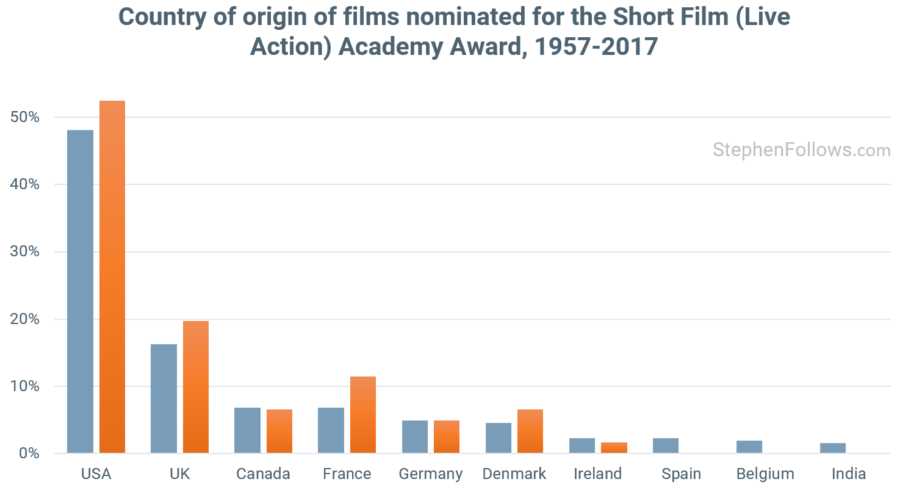
Who’s making the films?
Anyone who has been following the gender equality movement in the film industry may not be surprised that women make up a small percentage of the people behind Oscar-nominated short films – 14% of directors, 14% of writers and 27% of producers (1957-2017).
The Oscar situation was far bleaker for female filmmakers in the 1950s and 1960s, and things improved dramatically in the 1970s. Sadly, some of those gains have now been lost, with female representation among directors and writers declining since then.
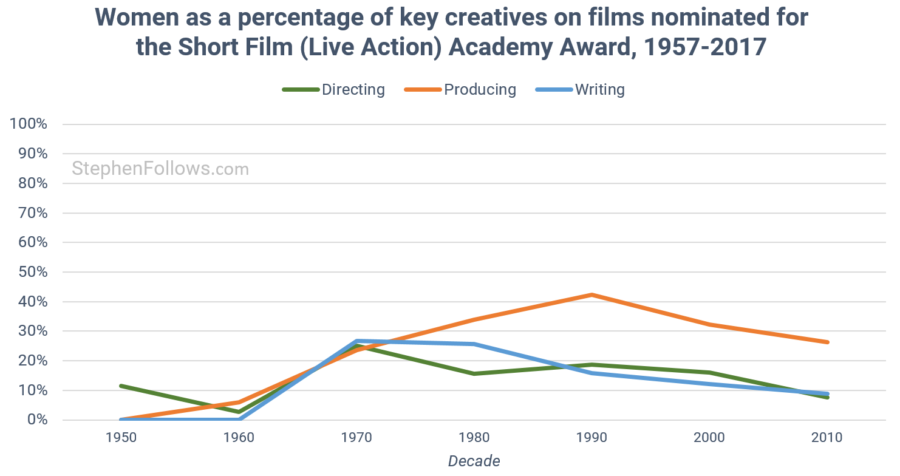
What are the films about?
Let’s end on a slightly lighter note. I took the plots of all short films nominated for the live-action Oscar and put them into a word cloud, where the more common a word is, the larger it appears.

So the ideal Oscar-baiting short film is likely to be an English-language 23-minute comedy which follows two young men as they learn about life and women. Please remember to thank me in your speech when you win.
Data
Today’s research was assisted by students on the MA Film Distribution and Marketing course at Birmingham City University. Their tutors, Pip Piper and Eugenio Triana, reached out to me last year and proposed that I set the students film data research projects. I jumped at the chance to have such knowledgeable, smart students help out and the end result is four projects which I’ll be sharing on the blog over the next few months. So a BIG thank you to Tanvi Dube, Harriet Gilholm, Wilfred Kinyanjui and Luisa Lemos Lessa for all their hard work and research on this week’s topic.
The raw data came from public sources, including IMDb, Wikipedia and the Academy website.
Epilogue
If you want an inside look at how it feels to take a short film to major festivals and on the path to the Oscars, I highly recommend the archives of Chris Jones’ blog. In 2007 he made a short entitled Gone Fishin’, starring Bill Paterson and right from the project’s inception Chris stated that his goal was to win the Best Short Film Award at the Oscars.
Many of you will know Chris as the author of the bestselling Guerrilla Filmmakers Handbook series or as the founder of the London Screenwriters’ Festival. Part of the promise he made to his audience and his crowdfunding backers was that he would share every step of the process on his blog. And that he did – chronicling everything from the shoot to major festivals to his path to the Oscars.
I shall avoid telling you any more, for fear of ruining what is a fascinating and meticulously-documented journey. Here are some weblinks to get you started:
- The best way of following Chris’ story in detail is to read all the blog articles which mention “Gone Fishin”. You can see choice selections of the most exciting moments here.
- You can see the trailer for Gone Fishin’ here and you can watch the whole short film here (if you have a Fandor subscription) or buy it on iTunes or on Blu-Ray.
- He also created an online seminar in which he teaches each step he took in the making of the film.
- Below is an example of the vlogs he made during the film’s festival run.





Comments
Thanks Stephen! Great stuff as usual!
Hello there! I have a question for you. 🙂 I am producing a short-movie with all of theses characteristics, except for one: language. The shortmovie will be in Spanish even though the title is in English and the story is very universal. You don’t advise that? I had also thought on recording it in English with Spanish actors that can speak it well (not bilinguals), just like in Sense8 for example. Could that work? Thank you so much!
Hi Carolina. I would imagine that the vast majority of the Academy voters speak only English so I can only guess that that would mean they would enjoy something in their native tongue more than a dubbed or subtitled film. But, if your film is good enough then the language shouldn’t matter.
Hi Stephen I just got qualified for the OSCARS by winning Indy Shorts.. Its a Danish short about refugees. I was wondering since its my first time, how I should approach this, and if there any tricks I need to know.
I would really appreciate it, as I so new to the OSCAR game.
thank you so much.
All the best
Sune Wahl
The thing to remember about the Oscars is that it is voted on only by members of the Academy of Motion Picture Arts and Sciences. But there are many online platforms are available where we can see Oscar short films free of cost.
Agree, remember to have your gold professionally graded and you should ensure that you organise the correct level of insurance to cover your investment.